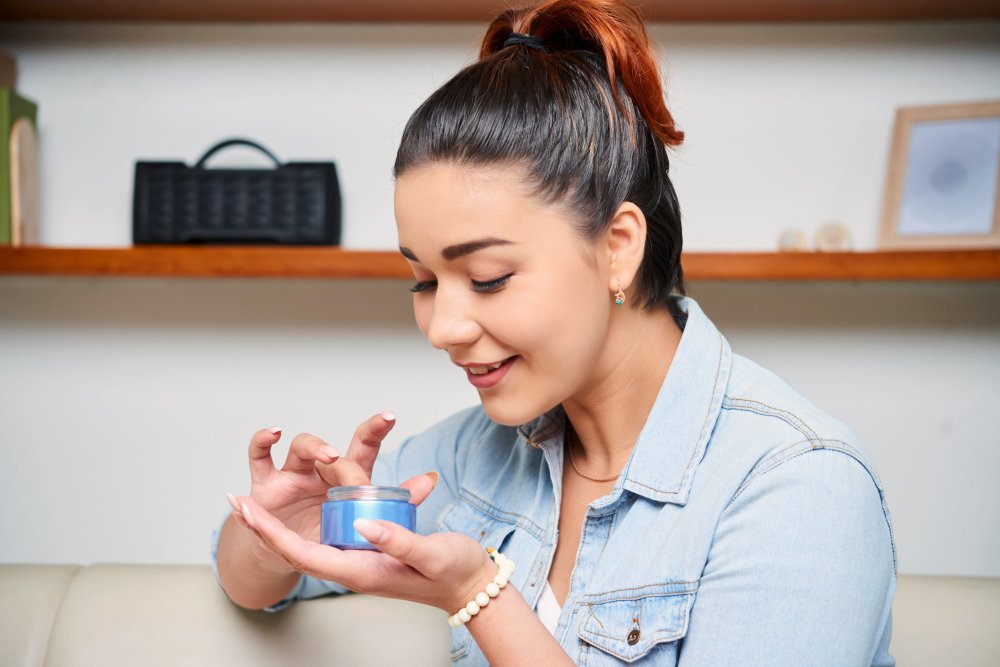How to Control Skin Allergy Naturally:
Skin allergies are a common condition affecting millions worldwide, causing discomfort through itching, redness, and irritation. While medications offer quick relief, many prefer natural solutions to address these issues holistically. Learning how to control skin allergy naturally can lead to long-term improvements without the side effects of synthetic treatments. Natural remedies such as hydration, diet, and herbal applications soothe symptoms and strengthen your skin’s resilience. This guide explores 10 effective methods to manage skin allergies naturally, helping you achieve healthier, irritation-free skin.
1. Identify and Avoid Allergens
The first step to managing skin allergies is to identify what triggers them. These triggers, also known as allergens, vary from person to person and can include dust, pollen, certain fabrics, cosmetics, or specific foods.
How Allergens Work: When your skin comes into contact with an allergen, your immune system overreacts, irritating.
Methods to Identify Allergens:
- Conduct a patch test by applying a small amount of a suspected substance to your skin and observing the reaction.
- Keep a symptom diary to track flare-ups and identify patterns.
Preventive Measures:
- Use hypoallergenic skincare products.
- Wear gloves when handling cleaning agents or irritants.
- Avoid environments that expose you to known allergens, such as pollen-heavy areas.
Taking proactive steps to avoid allergens reduces the frequency and severity of allergic reactions.

2. Maintain Proper Skin Hydration
Dry skin is more susceptible to allergens because it lacks the protective barrier that keeps irritants out. Keeping your skin hydrated is a crucial strategy for managing allergies naturally.
Benefits of Hydration:
- Strengthens the skin’s natural barrier.
- Reduces itching and flakiness.
Hydration Tips:
- Use natural moisturizers like aloe vera, shea butter, or coconut oil.
- Apply moisturizer immediately after bathing to lock in moisture.
- Drink plenty of water daily to keep your skin hydrated from within.
Hydrated skin is less prone to irritation and recovers faster from allergic reactions.

3. Use Natural Anti-Inflammatory Remedies
Natural remedies with anti-inflammatory properties can help soothe allergic reactions.
Aloe Vera & Turmeric:
- Contains compounds that reduce redness and inflammation.
- Apply fresh aloe vera gel directly to the affected area for instant relief.
- Turmeric’s active compound, curcumin, has anti-inflammatory effects.
- Create a turmeric paste with water and apply it to the irritated skin.
Chamomile:
- Chamomile tea can be used as a topical compress to calm irritated skin.
- Its natural antioxidants promote healing and reduce itching.
These natural treatments are gentle and effective, providing relief without causing further irritation.

4. Opt for a Skin-Healthy Diet
Your diet has a direct impact on your skin’s health. Certain foods can reduce inflammation and boost your skin’s ability to resist allergens.
Foods to Include:
- Omega-3 fatty acids: Found in salmon, walnuts, and flaxseeds, omega-3s help reduce inflammation.
- Antioxidant-rich foods: Blueberries, spinach, and oranges combat free radicals and promote healing.
- Probiotic foods: Yogurt, kimchi, and sauerkraut support gut health, which is linked to skin health.
Foods to Avoid:
- Processed foods and sugars, can increase inflammation.
- Dairy products, if you’re lactose intolerant or sensitive.
A balanced diet not only improves skin health but also enhances overall well-being.

5. Practice Stress Management Techniques
Stress is a significant factor in triggering or worsening skin allergies. When you’re stressed, your body releases hormones that can lead to inflammation and flare-ups.
Stress-Relief Methods:
- Meditation: Regular meditation calms the mind and reduces stress levels.
- Yoga: Combines physical movement with mindfulness, helping to relieve tension.
- Deep Breathing Exercises: Simple techniques like deep inhalation and exhalation help lower stress hormones.
Additional Tips:
- Ensure you get enough sleep, as sleep deprivation can exacerbate stress and skin issues.
- Engage in hobbies that relax you, such as painting, gardening, or reading.
Managing stress is an often overlooked but critical aspect of controlling skin allergies.

6. Choose Gentle and Natural Fabrics
The type of clothing you wear can have a significant impact on your skin’s health. Some fabrics irritate the skin and worsen allergic reactions.
Best Fabrics for Sensitive Skin:
- Cotton: Soft, breathable, and gentle on the skin.
- Linen: Lightweight and allows air to circulate, reducing sweating.
- Silk: Smooth and hypoallergenic, perfect for people with extremely sensitive skin.
What to Avoid:
- Synthetic materials like polyester and nylon, can trap heat and moisture.
- Wool, which can be scratchy and irritating.
Laundry Tips: Use hypoallergenic detergents that are free from fragrances and dyes to avoid additional irritation.
Switching to skin-friendly fabrics can drastically reduce allergic flare-ups caused by external irritants.

7. Apply Cool Compresses
One of the simplest and most effective ways to alleviate skin allergies is by using cool compresses.
Benefits of Cool Compresses:
- Reduces itching and inflammation instantly.
- Soothes irritated skin and provides a calming effect.
How to Use:
- Soak a clean cloth in cold water or wrap it around ice cubes.
- Apply the compress to the affected area for 10-15 minutes.
- Repeat as needed throughout the day.
Pro Tip: Adding chamomile tea to the cold water can enhance the soothing effect.
Cool compresses provide immediate relief and are particularly effective for acute flare-ups.

8. Strengthen Your Skin’s Barrier with Oils
Natural oils are highly effective in repairing and strengthening the skin’s barrier. They also help lock in moisture and protect against allergens.
Best Oils for Skin Health:
- Coconut Oil: Has antibacterial and anti-inflammatory properties, making it ideal for irritated skin.
- Argan Oil: Rich in vitamin E, it nourishes and repairs damaged skin.
- Jojoba Oil: Mimics the skin’s natural sebum, providing deep hydration without clogging pores.
How to Apply:
- Cleanse the affected area with mild soap and water.
- Apply a small amount of oil and gently massage it into the skin.
- Use oils as part of your daily skincare routine for maximum benefits.
Natural oils are a safe and effective way to maintain healthy, allergy-resistant skin.

9. Protect Your Skin from Environmental Factors
Environmental factors like sun exposure, pollution, and extreme weather conditions can exacerbate skin allergies. Taking protective measures can prevent flare-ups.
Sun Protection:
- Use a natural sunscreen that contains zinc oxide or titanium dioxide.
- Wear wide-brimmed hats and protective clothing when outdoors.
Pollution Protection:
- Wash your face thoroughly after exposure to pollutants.
- Use antioxidant-rich serums to neutralize the effects of free radicals.
Weather-Specific Tips:
- In winter, use a humidifier to keep the air moist and prevent skin dryness.
- During summer, stay hydrated and wear loose, breathable clothing.
Being mindful of environmental triggers helps you stay one step ahead in controlling skin allergies.

10. Incorporate Herbal Teas and Natural Supplements
Herbal teas and supplements can offer additional support in managing skin allergies by reducing inflammation and boosting your immune system.
Beneficial Herbal Teas:
- Green Tea: Rich in antioxidants, it helps reduce skin inflammation.
- Peppermint Tea: Has natural antihistamine properties that soothe allergic reactions.
- Licorice Root Tea: Reduces inflammation and promotes skin healing.
Supplements to Consider:
- Quercetin: A natural antihistamine found in onions, apples, and supplements.
- Vitamin C: Boosts immunity and reduces allergic reactions.
- Omega-3 Fatty Acids: Available as fish oil supplements, these help combat inflammation.
Adding herbal teas and supplements to your routine provides holistic support for allergy management.

Conclusion
Understanding how to control skin allergy naturally is essential for maintaining healthy and comfortable skin. By adopting natural remedies, avoiding common allergens, and making simple lifestyle adjustments, you can significantly reduce flare-ups and irritation. These holistic methods not only address the symptoms but also improve your skin’s overall health and immunity. With consistency and care, managing skin allergies becomes an achievable goal. Embrace these natural strategies, and enjoy smoother, healthier skin for the long term.
Discover amazing information and unique finds on FuseBay! Don’t miss out—visit our website for exclusive articles and top-notch blogs tailored just for you!
FAQs on How to Control Skin Allergy Naturally
1. What are the most effective natural remedies for skin allergies?
Natural remedies like aloe vera, coconut oil, chamomile tea compresses, and turmeric paste are highly effective for soothing skin allergies. These remedies reduce inflammation, calm itching, and promote healing without causing side effects.
2. How can I identify the allergens causing my skin allergies?
You can identify allergens by conducting a patch test, maintaining a symptom diary, or consulting a dermatologist for allergy testing. Tracking your exposure to specific substances or foods can help pinpoint triggers.
3. Can a healthy diet help in controlling skin allergies?
Yes, a balanced diet rich in omega-3 fatty acids, antioxidants, and probiotics can reduce inflammation and improve skin health. Avoiding processed foods, sugars, and potential irritants like dairy can also prevent flare-ups.
4. How does stress affect skin allergies?
Stress can trigger or worsen skin allergies by causing hormonal imbalances that lead to inflammation. Practicing stress management techniques such as meditation, yoga, and deep breathing can help reduce allergic reactions.
5. Are natural remedies safe for everyone?
While natural remedies are generally safe, it’s important to perform a patch test before using them extensively. Some individuals may still have sensitivities to certain natural ingredients. Consulting a dermatologist is recommended for severe or persistent allergies.







